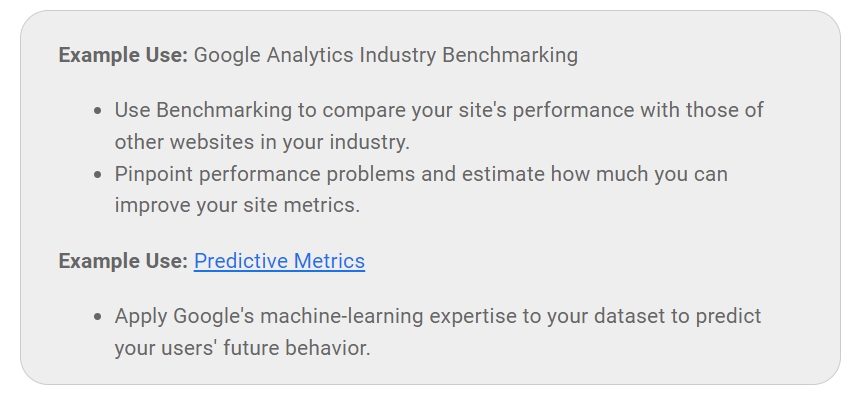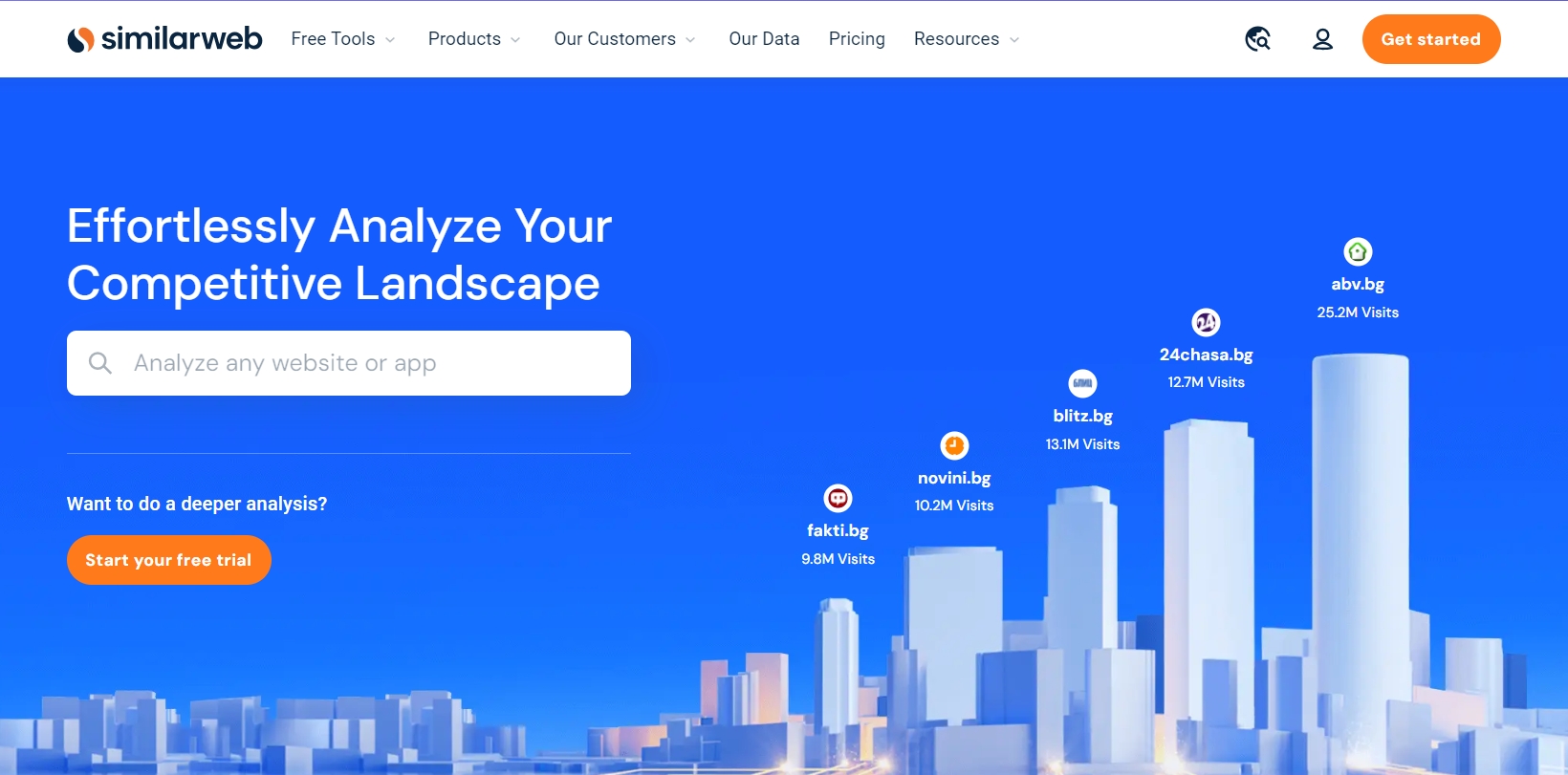Google Analytics benchmarking reports allow you to see how your website is trending in your industry. The problem, however, is that these reports currently don’t exist. Don’t panic though. When they appear, we will update this article. Until then, you can get useful data from other resources we have listed here.
Key takeaways
- You can allow GA4 to collect data for benchmarking, but reports are not available (yet)
- Benchmarking is useful, but using the data can be risky
- Besides GA4, you can use an alternative tool for benchmarking data about your industry
What is benchmarking in GA4, anyway?
Benchmarking in Google Analytics 4 is the process of collecting data about other sites in your industry. This anonymous information is helpful to compare how your site is performing compared to others. It also can help you detect possible weaknesses in your marketing efforts.
GA4 doesn’t collect benchmarking data by default, but you can activate it under 10 seconds.
How can you activate benchmarking in Google Analytics 4?
In order to give Google Analytics 4 permission to collect data for benchmarking, you need to be logged in as an Administrator or Editor. Then follow these steps.

You can access your account settings by clicking on the Admin button in the left-bottom corner.
Step 2: Click “Account settings”

Always make sure you are in the proper GA4 account before changing any of the settings.
Step 3: Tick the checkbox “Modeling contributions & business insights”

Benchmarking is grouped with other features, like predictions and modeled data.
Step 4: Save your Account settings

If you click the Save button, Google will start collecting data from your account anonymously.
What we know about GA4 benchmarking for now
At this moment, we can only guess how benchmarking data is going to be available in your GA4 account. It’s, for instance, unclear if the data will be available as separate reports.
When you activate benchmarking, GA4 gives an example of what to expect, but I call that a definition and not an example.

I prefer data over guesswork, so I will stick to the facts and what we can read between the lines.
- To unlock benchmarking in GA4, you need to give the tool explicit permission to collect data for benchmarking. Fair enough.
- Benchmarking is not a standalone setting. The moment you allow GA to use your data, you will also be able to profit from predictive metrics.
- You can only activate benchmarking on Account level and not on property level. If you are not familiar with the difference between those two, I recommend you read our article about the GA4 account structure.
- If you allow benchmarking, you allow GA4 to use all the data of all the websites and apps that are housed in your GA4 account.
- The data is shared, but GA anonymizes and aggregates it. In other words, nobody will be able to link the data with your website. Benchmarking data is very broad. It’s just good enough to get some general information about industry segments.
- Only editors and administrators have the permissions in GA4 to activate benchmarking. That makes sense even if benchmarking is mainly useful for marketers.
Let's start with understanding how Google collects this data and how it even knows in which industry your business is operating.
Which industry verticals does GA4 use for benchmarking?
If you set up a Google Analytics account, you have to choose in which industry your business is operating. You can choose between 26 different options. In fact 25. The last option is for every organization that doesn’t fit in one of the industry verticals.
- Arts & Entertainment
- Auto & Vehicles
- Beauty & Fitness
- Books & Literature
- Business & Industrial
- Computer & Electronics
- Finance
- Food & Drink
- Games
- Health
- Hobbies & Leisure
- Home & Garden
- Internet & Telecom
- Jobs & Education
- Law & Government
- News
- Online Communities
- People & Society
- Pets & Animals
- Real Estate
- Reference
- Science
- Shopping
- Sports
- Travel
- Other Business Activity
That’s a pretty limited list, if you ask me.
GA4 business size benchmarking
During the setup of your GA4 account, you have to let Google know how big your business is.
- Small – 1 to 10 employees
- Medium – 11 to 100 employees
- Large – 101 to 500 employees
- Very Large – 501+ employees
Although Google doesn’t admit it publicly, let’s hope this data is taken into serious consideration for benchmarking.
After all, it would deeply hurt your ego as a freelancer if your site would be compared with the one of an enterprise.
For now, that’s about all we know about benchmarking in GA4.
Before we look at an alternative benchmarking source, let me quickly explain why this data is important. And not.
Why is industry benchmarking important for every website?
GA4 gives two reasons benchmarking can be important. Let me quote what you see in your GA4 account settings:
- “Use Benchmarking to compare your site's performance with those of other websites in your industry.”
- “Pinpoint performance problems and estimate how much you can improve your site metrics.”
Compare with others in your industry, analyze, improve.
In other words: benchmarking is a step of competitive analysis. But instead of dissecting your direct competitors, you have a much broader set of anonymous data to compare your site with.
To be honest, you don’t know if you are comparing apples to oranges, or grapes with pumpkins. Therefore, it is important to know what data you are actually looking at.
Put your benchmarking data into context!
I love benchmarking reports. But, keep in mind these reports are not much use without context.
If you read our post on cross-domain tracking, you know what I mean. Some sites, like the Google Merchandise Store (GMS), get most of their traffic from YouTube and other Google-owned websites.Their approach to customer acquisition can be entirely different from the rest of their industry.

Without context, an over-performing referral traffic appears out of place. With meaning, we understand the GMS is leveraging a competitive advantage.
Make sure you add context to your benchmarking data. Think about why your site might be above or below industry standards.
Do these metrics indicate that you need to make changes?
Or do they show that you've strategically prioritized specific traffic channels above others?
Again, t at this point, there is no benchmarking data in GA4. Yet, I am confident that this will soon change.
We, at Data Driven U, have been following Google Analytics 4 from the first release and I can tell you that changes and improvements keep coming.
So, you just wait? No, of course not…
GA4 alternative benchmarking tool
Although Google is the absolute emperor of collecting website data, it’s not the only one. I want to briefly point to an alternative tool that can provide you with benchmarking data for your industry.

The site can reveal more than pure website benchmarking data. You can, for instance, also run a scan for Facebook and Twitter. Pardon, I meant X.
The site offers some free tools, but to get a thorough analysis, you will need a paid account. If you don’t want to wait until Google Analytics launches benchmarking reports in your account, this is your best option.
Final note on benchmarking in Google Analytics
It’s useful to compare your site with others in your industry. But at this moment, you can only help GA collect benchmarking data faster by giving it explicit permission to do so.
Don’t wait until GA4 makes benchmarking reports and data available in your account. You can use alternative resources.
After all, benchmarking is a great starting point for looking at trends in your market. But this shouldn't complete your analysis. You need to dig deeper, add context, and bring in other reports to find real meaning in these trends.
GA4 is filled with data and reports that give you and your team enough insights to understand how your site is performing. It also gives insights about what you can do to improve the user experience.
If you don’t know how to get the most out of GA4, have a look at our programs for data-driven marketers. They will get you way further than any benchmarking report will ever do.


